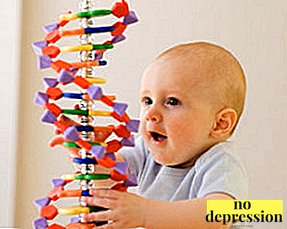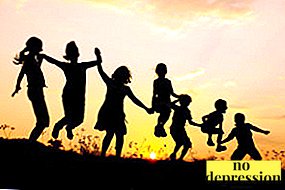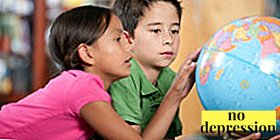Cognitive development - this development concerns all mental processes occurring in the human brain: perception, assimilation and understanding of concepts, ability to memorize, save and reproduce information, solving various problems, logical thinking, imagination.
Basic concepts of the theory

Founder of cognitive theory is Jean Piaget, who was active in the fields of psychology and philosophy.
He conducted an extensive amount of research into the characteristics of cognitive development, and derived a number of basic concepts.
According to Piaget, the child’s cognitive abilities are qualitatively different from the thinking of an adult, and it’s wrong to consider the children's way of thinking to be primitive.
Mental processes in children improve and change as they develop in society and in the world as a whole.
At childhood, the development of intelligence does not end there. It continues in one way or another throughout a person’s life.
The basic concepts appearing in the theory of Piaget:
- Scheme of action. By this definition is meant the totality and sequence of actions (both intellectual and physical), which allow a person to experience the surrounding reality in a certain way. Schemes provide an opportunity to perceive the whole flow of information and isolate the most valuable information from it. They are associated with both knowledge and the mechanisms for their acquisition. If a person has received a new piece of information in the process of cognition, this information (obtained experimentally or by other methods) influences the patterns of action, which are adjusted in accordance with the new data. Some schemes that conflict with new information are significantly recycled or completely replaced. Example: a child sees a cat for the first time. This cat is fluffy, with long hair, so he may decide that all cats look like this, but later he finds out that there are cats with short hair and sphinxes that do not have it at all. His cognitive schemes vary in accordance with the findings.
 Assimilation. The process of entering information into an existing scheme of action is called assimilation. In this case, the correction takes place in accordance with the already existing personal characteristics of the individual, his interests, experience and knowledge, therefore, only the information that he considers valuable and for which certain schemes already exist is entered into the scheme. Also, information is modified, correlating with the personality settings and priorities.
Assimilation. The process of entering information into an existing scheme of action is called assimilation. In this case, the correction takes place in accordance with the already existing personal characteristics of the individual, his interests, experience and knowledge, therefore, only the information that he considers valuable and for which certain schemes already exist is entered into the scheme. Also, information is modified, correlating with the personality settings and priorities.- Accommodation. The process of replacing the circuit or its correction depending on the data obtained is called accommodation. Example: for the first time a child is confronted with a pyramidal object, examines it, twists it in his hands and adjusts his schemes of action. When he needs to interact again with an object of this shape, his palm will bend in a certain way so that the object does not slip out of it upon contact.
- Balancing This is the process of finding a balance between assimilation and accommodation, associated with the desire to acquire consistent data and take a step forward in development processes.
On the periodization of the development of intelligence by Jean Piaget in this video:
Factors affecting cognitive development
The process of cognitive development in each person takes place in different ways, depending on his personal characteristics, the influence of the environment, the environment and many other factors.
The main factors influencing cognitive development:
 Genetics. All children receive a set of genes from their parents, which determines many aspects of their cognitive development. Some children are improving very quickly, their development is ahead of the age standards, while others learn less information and change the patterns of action more slowly, so their developmental speed is slow. Children with genetic diseases that significantly affect the intellect should also be considered: Down's syndrome, Williams syndrome, Angelman syndrome, Prader-Willi syndrome, Rett syndrome, and others. They develop not in the same way as children without deviations, and require a special approach in upbringing and education.
Genetics. All children receive a set of genes from their parents, which determines many aspects of their cognitive development. Some children are improving very quickly, their development is ahead of the age standards, while others learn less information and change the patterns of action more slowly, so their developmental speed is slow. Children with genetic diseases that significantly affect the intellect should also be considered: Down's syndrome, Williams syndrome, Angelman syndrome, Prader-Willi syndrome, Rett syndrome, and others. They develop not in the same way as children without deviations, and require a special approach in upbringing and education.- The process of pregnancy. Disorders that occur during pregnancy and childbirth, affect the cognitive development of the child in the future. If the mother underwent infectious diseases during pregnancy (measles, syphilis, influenza, hepatitis, rubella, herpes, toxoplasmosis), has chronic diseases that can affect the formation of the brain in the fetus (cardiovascular diseases, arterial hypertension, anemia, endocrine pathologies, features of diabetes mellitus), her child may in the future have delays in cognitive development, including pronounced, associated with arising intrauterine pathologies.
- The influence of the environment. Inadequate, inadequate nutrition in the first years of a child’s life also negatively affects the processes of his development, therefore systematically malnourished children with hypovitaminosis and beriberi more slowly absorb information and lag far behind their peers who eat well. Also a significant impact has the presence or lack of attention to the child from adults.
 With children, especially with babies and newborns, it is important to communicate regularly so that they develop properly. Kids should have the opportunity to get acquainted with the world, play games, interact with toys, communicate with different people so that their development is not slow.
With children, especially with babies and newborns, it is important to communicate regularly so that they develop properly. Kids should have the opportunity to get acquainted with the world, play games, interact with toys, communicate with different people so that their development is not slow. - The number of children in a single family. According to popular belief, the more children in one family, the more developed each of them. But this is not the case: in families with a large number of children, the first two children have the highest level of IQ, and the youngest child has the lowest level. The approximate difference in points between elder and younger is 10, rarely more.
- The social status of the family. It is obvious that children of wealthy parents have more opportunities for full-fledged development: they are better fed, they can get a better education, therefore children from poor and rich families have an average IQ level. However, children from large families have well-developed social skills, which positively affects their future social interactions.
- The influence of the school. In most schools, teachers prefer students to sit quietly in the classroom, listen to them and ask fewer questions, which adversely affects children's development processes. Also, much depends on the personalities of teachers, their general attitude towards students and to the subject. For example, if a teacher loves his subject very much and seeks to lay out information so that it is clear to all children, regardless of the level of its complexity, most of his students will develop in this area quickly.
 Personal characteristics of the child. Features of temperament, a formed outlook on life, character, interests - all of this affects how quickly a child learns information. If, for example, the subject is not at all interesting for the child, he will assimilate the information slowly and quickly, but if the teacher makes an effort, the child may become interested in the subject, and then the speed of its development in this direction will increase.
Personal characteristics of the child. Features of temperament, a formed outlook on life, character, interests - all of this affects how quickly a child learns information. If, for example, the subject is not at all interesting for the child, he will assimilate the information slowly and quickly, but if the teacher makes an effort, the child may become interested in the subject, and then the speed of its development in this direction will increase.- Personal features of parents. Intellectually developed, creative parents in most cases seek to give their child as much valuable information as possible, and he adopts from them a view of life, interests, and much more.
Also harmful are the habits of the mother and many other factors (use of drugs that adversely affect the fetus, stress, mental disorders, eating habits).
Children growing up in families with smart, diversified parents develop many times faster than those children whose parents have practically no interest in anything.
Piaget Stages
First: from birth to the age of two
A young child perceives the world primarily through actions, comparing sensory impressions and physical interaction with something. At this time, innate reflexes are actively cultivated.
The main aspects of the period:
- Kids love to watch attention-grabbing objects.that have saturated colors, glitter, glow, move, and interact with them.
- Making their own schemes, children tend to repeat any actions.using your physical abilities. Examples: reach for a toy, drop something, to see what happens, jump into a puddle just like the other child did, feel the object that came to hand.
 Speech perception The first time a child hears the voices of other people before birth and, having been born, already knows how to distinguish the voice of a mother from other voices. Already in the first days of their life, children show the ability to distinguish one voice sounds from others, to understand emotions.
Speech perception The first time a child hears the voices of other people before birth and, having been born, already knows how to distinguish the voice of a mother from other voices. Already in the first days of their life, children show the ability to distinguish one voice sounds from others, to understand emotions.- In the first months of life, a child most often interacts with others with a cry, crying, and later learns to express emotions with the help of facial expressions, use gestures (for example, can indicate something with a finger), remembers the first words and learns to use them.
Second: from two to seven years
Most often, at this age, the child enters children's educational institutions, improves their social skills when communicating with adults and peers, and gains knowledge outside the home.
The main aspects of the period:
- Children learn to communicate with other people., build the first social ties (friendship, friendship).
- Features of communication. A preschooler, getting acquainted with something, giving an assessment of events, making decisions, is guided mainly by his personal experience. This feature is called egocentric thinking. It is difficult for him to look at the situation from different sides, to put himself in a strange place. Example: when transferring members of his family, a child does not include himself in this list, since he perceives everything exclusively from his own point of view, but he does not see himself from his own perception.
 Kids are very curiousThey are interested to know everything about the world around them, so they ask a huge number of questions to adults. This stage in the life of a child in everyday life is often called the age of “why-boy”.
Kids are very curiousThey are interested to know everything about the world around them, so they ask a huge number of questions to adults. This stage in the life of a child in everyday life is often called the age of “why-boy”.- Animism. A child animates inanimate objects, for example, considers a plush dog alive and can use the phrase “it hurts her, she cries” in her attitude if she falls.
Third: from seven to eleven years
At this stage, children begin to gradually use logic when analyzing various situations.
The main aspects of the period:
- The child is able to look at different things from different sides, can simulate situations and their outcomes in the head. For example: if he got a deuce, he can start to think of what to say so that the parents react to it gently.
- There are abilities to deductive thinking., but simplified: for example, if there are visual reference points - Maxim is below Sveta, Sveta is below Sasha, respectively, Sasha is above Maxim.
- The ability to comprehend such concepts as weight, volume, space, time and others appears. Example: a child is able to plan his time, to realize how soon an event will occur.
Socio-cognitive development of the child. Lecture in this video:
Exercises for different ages
There are certain exercises that accelerate the speed of development in people belonging to different age groups, improve memory and other cognitive functions:
 Students. The brains of children and adolescents are plastic, so at this age you can quickly learn a lot of different information. Positively, cognitive development at this age is influenced by playing musical instruments, learning new languages, reading, various logic games, including chess, checkers, some computer games, for example, adventure quests, where you need to logically interact with objects and people for passing.
Students. The brains of children and adolescents are plastic, so at this age you can quickly learn a lot of different information. Positively, cognitive development at this age is influenced by playing musical instruments, learning new languages, reading, various logic games, including chess, checkers, some computer games, for example, adventure quests, where you need to logically interact with objects and people for passing.- Adults. The first failures in cognitive functions are observed in most people after twenty to thirty years. This is partly due to the fact that adults are increasingly using familiar patterns and do not change anything. To keep the brain in order, it is useful to learn languages, use a non-standard approach in different situations (a simple example: you can use different ways to get to work), watch movies in unusual genres, play logic games, find new hobbies.
- Elderly people. At this age, the most important thing is not to achieve degradation and to preserve all cognitive functions, since the brain in the elderly functions worse and worse, the risk of Alzheimer's disease increases. To preserve the functions, it is useful to sculpt from clay, keep a diary, listen to and perform musical works, memorize poems, play logical board games, read.
If you regularly load the brain with workouts, develop in different directions, learn new skills, engage in creativity, cognitive functions will not weaken, and life will be more interesting and brighter.
How to train the brain? Memory? Thinking? Tatyana Vladimirovna Chernigov will tell in this video:

 Assimilation. The process of entering information into an existing scheme of action is called assimilation. In this case, the correction takes place in accordance with the already existing personal characteristics of the individual, his interests, experience and knowledge, therefore, only the information that he considers valuable and for which certain schemes already exist is entered into the scheme. Also, information is modified, correlating with the personality settings and priorities.
Assimilation. The process of entering information into an existing scheme of action is called assimilation. In this case, the correction takes place in accordance with the already existing personal characteristics of the individual, his interests, experience and knowledge, therefore, only the information that he considers valuable and for which certain schemes already exist is entered into the scheme. Also, information is modified, correlating with the personality settings and priorities. Genetics. All children receive a set of genes from their parents, which determines many aspects of their cognitive development. Some children are improving very quickly, their development is ahead of the age standards, while others learn less information and change the patterns of action more slowly, so their developmental speed is slow. Children with genetic diseases that significantly affect the intellect should also be considered: Down's syndrome, Williams syndrome, Angelman syndrome, Prader-Willi syndrome, Rett syndrome, and others. They develop not in the same way as children without deviations, and require a special approach in upbringing and education.
Genetics. All children receive a set of genes from their parents, which determines many aspects of their cognitive development. Some children are improving very quickly, their development is ahead of the age standards, while others learn less information and change the patterns of action more slowly, so their developmental speed is slow. Children with genetic diseases that significantly affect the intellect should also be considered: Down's syndrome, Williams syndrome, Angelman syndrome, Prader-Willi syndrome, Rett syndrome, and others. They develop not in the same way as children without deviations, and require a special approach in upbringing and education. With children, especially with babies and newborns, it is important to communicate regularly so that they develop properly. Kids should have the opportunity to get acquainted with the world, play games, interact with toys, communicate with different people so that their development is not slow.
With children, especially with babies and newborns, it is important to communicate regularly so that they develop properly. Kids should have the opportunity to get acquainted with the world, play games, interact with toys, communicate with different people so that their development is not slow. Personal characteristics of the child. Features of temperament, a formed outlook on life, character, interests - all of this affects how quickly a child learns information. If, for example, the subject is not at all interesting for the child, he will assimilate the information slowly and quickly, but if the teacher makes an effort, the child may become interested in the subject, and then the speed of its development in this direction will increase.
Personal characteristics of the child. Features of temperament, a formed outlook on life, character, interests - all of this affects how quickly a child learns information. If, for example, the subject is not at all interesting for the child, he will assimilate the information slowly and quickly, but if the teacher makes an effort, the child may become interested in the subject, and then the speed of its development in this direction will increase. Speech perception The first time a child hears the voices of other people before birth and, having been born, already knows how to distinguish the voice of a mother from other voices. Already in the first days of their life, children show the ability to distinguish one voice sounds from others, to understand emotions.
Speech perception The first time a child hears the voices of other people before birth and, having been born, already knows how to distinguish the voice of a mother from other voices. Already in the first days of their life, children show the ability to distinguish one voice sounds from others, to understand emotions. Kids are very curiousThey are interested to know everything about the world around them, so they ask a huge number of questions to adults. This stage in the life of a child in everyday life is often called the age of “why-boy”.
Kids are very curiousThey are interested to know everything about the world around them, so they ask a huge number of questions to adults. This stage in the life of a child in everyday life is often called the age of “why-boy”. Students. The brains of children and adolescents are plastic, so at this age you can quickly learn a lot of different information. Positively, cognitive development at this age is influenced by playing musical instruments, learning new languages, reading, various logic games, including chess, checkers, some computer games, for example, adventure quests, where you need to logically interact with objects and people for passing.
Students. The brains of children and adolescents are plastic, so at this age you can quickly learn a lot of different information. Positively, cognitive development at this age is influenced by playing musical instruments, learning new languages, reading, various logic games, including chess, checkers, some computer games, for example, adventure quests, where you need to logically interact with objects and people for passing.

